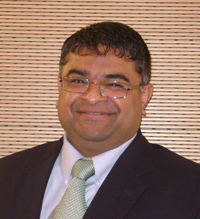 |
Chandran Achutan, Ph.D. |
Chandran Achutan, Ph.D., assistant professor in the UNMC College of Public Health, led a study that recommends that tobacco smoke be banned in three Las Vegas casinos that were part of his study.
Though the recommendations carry no mandate, study results may have broad implications and could be used by agencies to consider banning smoking in casinos nationwide.
“We found evidence of workplace exposure to a tobacco-specific carcinogen among casino dealers engaged in games such as black jack and keno where customers are allowed to smoke,” Dr. Achutan said. “Based on the known link between environmental tobacco smoke exposure and health effects, we recommend establishing casino-wide, no smoking policies and developing smoking cessation programs for casino employees.”
|
Researchers measured environmental tobacco smoke exposure and surveyed 124 non-poker dealers, including those who deal blackjack and keno, at Bally’s, Paris and Caesars Palace, where customers are allowed to smoke.
Investigators particularly looked at the level of NNAL — a known carcinogen in tobacco smoke — in the urine of casino dealers.
Researchers asked dealers about symptoms that may have been related to environmental tobacco smoke exposure, took personal breathing zone and area air samples and took urine samples at the beginning and end of the workshifts to see if components of the smoke were absorbed in the body. Dealers and casino office staff also were asked about their work, medical problems and symptoms.
In addition, Dr. Achutan said more dealers reported respiratory symptoms than administrative and engineering employees, but the differences between the groups were not statistically significant.
As a public health professor, Dr. Achutan would like to see people not be exposed to tobacco smoke in occupational or non-occupational settings, noting that a surgeon general report has linked secondhand tobacco smoke exposure to lung cancer.
“Although our recommendations are not enforceable, OSHA and other agencies can use the findings to set occupational health standards,” he said.